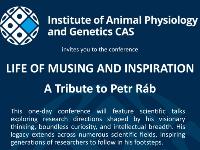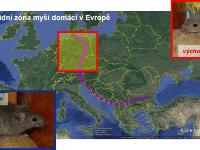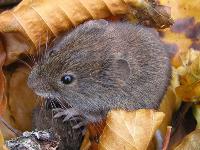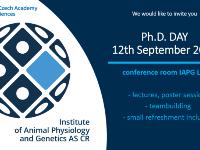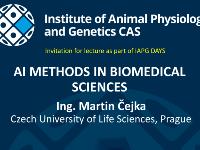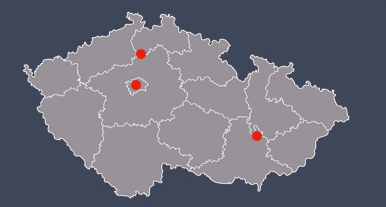
Actualities
Actualities
Search
Selected range: all newsDear colleagues,
We warmly invite you to the conference "Life of Musing and Inspiration: A Tribute to Petr Ráb" held in memory of our dear friend and esteemed colleague Petr Ráb, to honor not only his scientific legacy but also his enduring personal impact. The conference is organized by the Institute of Animal Physiology and Genetics of the Czech Academy of Sciences, where Petr worked for many years.
The Institute of Animal Physiology and Genetics of the Czech Academy of Sciences announces with deep sorrow that on November 16, 2024, at the age of 73, the world lost an exceptional scientist, a passionate advocate for science, a respected academician, a professor, former director, and above all, an extraordinary person and beloved colleague, Prof. Ing. Petr Ráb, DrSc., dr. h. c.
The close relationship between house mice and humans offers scientists a unique opportunity to study historical human migrations. A recent study by researchers from the Institute of Animal Physiology and Genetics of the CAS and the Institute of Vertebrate Biology of the CAS, published in the Zoological Journal of the Linnean Society, brings new insights. The extensive research included genetic samples from over 8,000 mice and is reshaping our understanding of the colonization of Europe by mice, providing a fresh perspective on human–animal interactions.
In the face of rapidly changing climate conditions, genetic mixing may be a key factor for species survival, enabling critical new adaptations. This is the conclusion of a research study conducted by a team of scientists from the Institute of Animal Physiology and Genetics of the Czech Academy of Sciences (IAPG CAS), in collaboration with colleagues from Oklahoma University and Cornell University in the United States. Their findings could help reshape current approaches to the conservation of endangered species.
Nowadays, when open publishing is increasingly widespread, it is essential to distinguish between the characteristics of trustworthy and predatory journals. This workshop aims to provide the key information and skills needed to safely navigate the open publishing space for researchers, academics and students. Participants will learn to recognise trustworthy journals and understand the characteristics of predatory publishers.
Dovolujeme si Vás pozvat na Ph.D. den v Liběchově, kde budou celý den probíhat přednášky studentů prvních, pátých a pokročilejších ročníků, třeťáci a čtvrťáci se představí formou posteru. Součástí programu bude i zvaná přednáška o predátorských časopisech.
We are pleased to invite you to a lecture as part of the IAPG DAYS, taking place on Thursday, May 23, 2024, in Liběchov, starting at 9:45 AM. The lecture, titled "AI Methods in Biomedical Sciences," will be delivered by Ing. Martin Čejka from the Czech University of Life Sciences in Prague.
We are pleased to invite you to a lecture as part of the IAPG DAYS, taking place on Thursday, May 23, 2024, in Liběchov, starting at 9:45 AM. The lecture, titled "AI Methods in Biomedical Sciences," will be delivered by Ing. Martin Čejka from the Czech University of Life Sciences in Prague.



